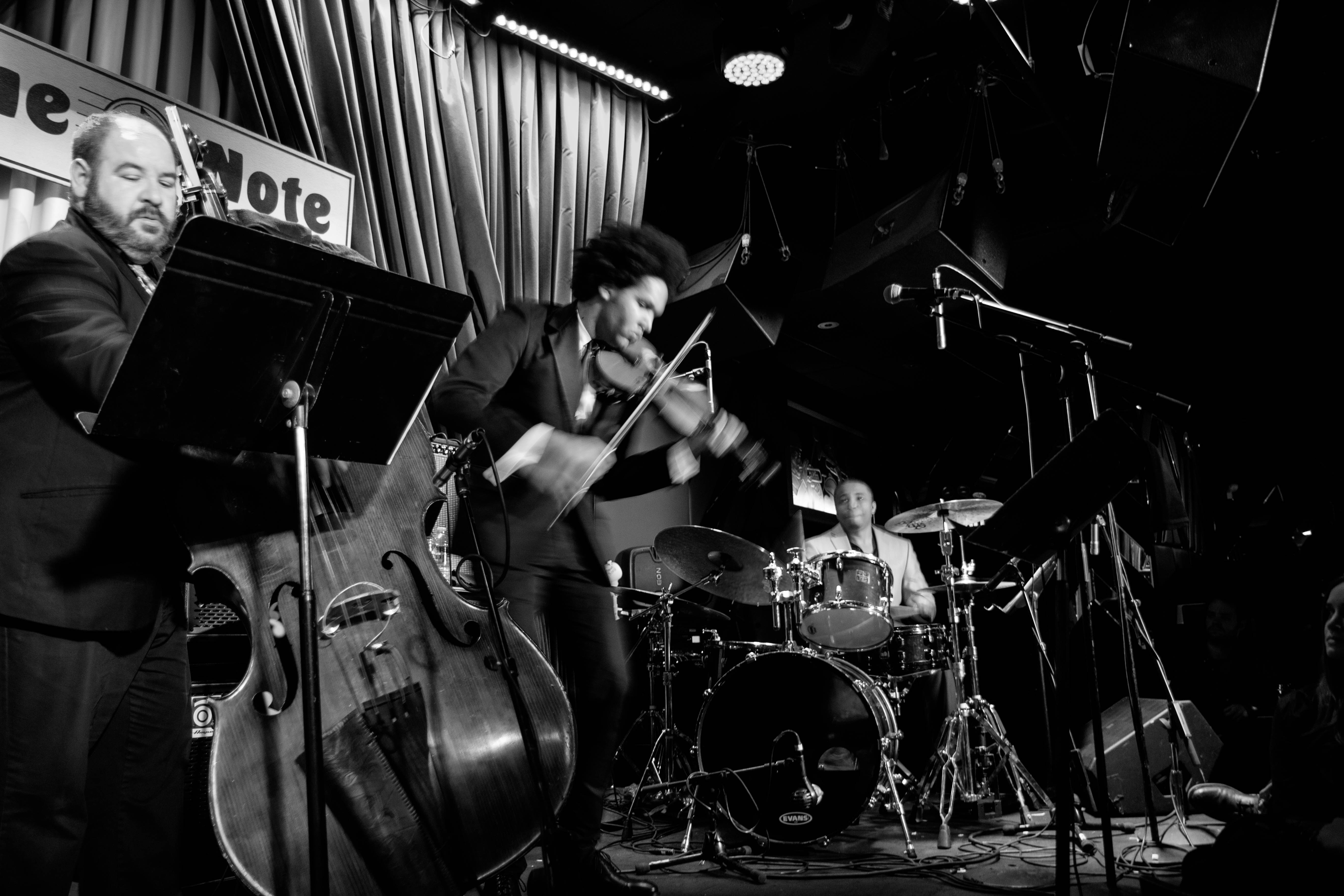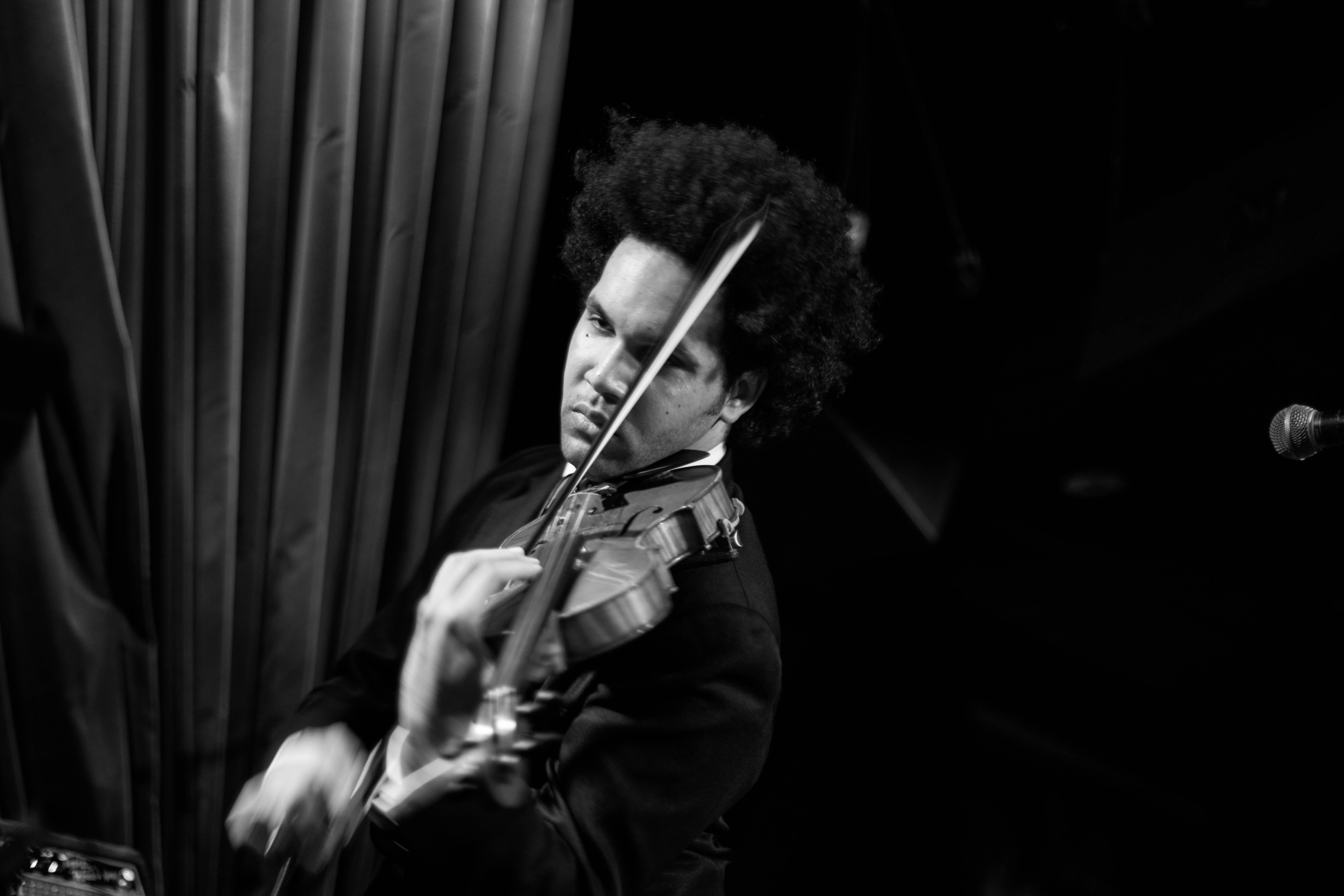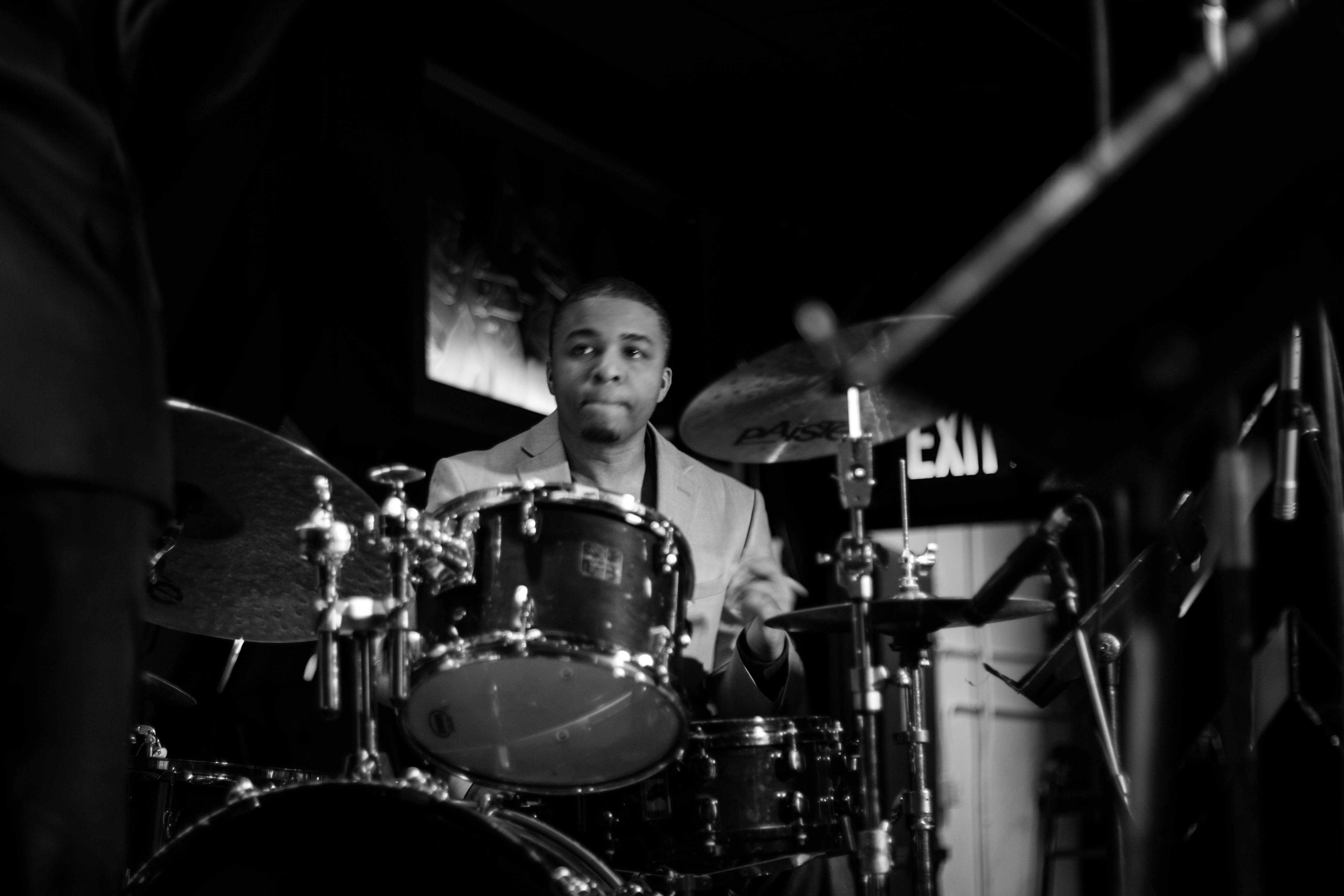Violin is not not a typical instrument in jazz but the sound of it, when you do get a chance to hear it, is totally amazing. Recently I got to see Scott Tixier, New York based french violinist, perform during the late night session at the Blue Note. His quartet featured Marco Panascia on bass, Andrew Atkinson on drums and Sharik Hasan on piano. Tixier has received a lot critical acclaim since he moved to NYC and he was nominated as “the rising star violin” by the Downbeat magazine in 2012. He has performed with well established musicians including Anthony Braxton, Herbie Hancock, Maceo Parker, Helen Sung and many others.
The quarter played Scott’s original compositions and had a great overall vibe. Tixier has a very distinct sound and he is a skillful composer and improviser. His drummer was particularly memorable and the chemistry between the two of them and their musical exchanges was quite outstanding.
Anna: Thank you for taking the time to speak with me. Was music a big part of your life when you were growing up?
Scott: Yes, my mother is a dance teacher and my dad is a theater director. So we always had music in the house and they used different music for their shows. I started playing music when I was three. I went to the Montreuil Conservatory, where they had a special class for little kids to initiate them into music in general and I played percussion and piano. Then when I was six I started studying solfeggio and then shortly after I started playing the violin.
A: And when did you get into jazz?
S: My mum used to listen to Ella Fitzgerald a lot, first I didn’t really understand it. I think I started to like it when I was fourteen. That’s also when I started listening to Stéphane Grappelli and I really became interested in jazz.
A: Who were your main influences as far as jazz violinists?
S: One of the first ones was Eddie South and of course Stéphane Grappelli. And then they were some local people, people from Paris, who are not necessarily well known, but who were really important for me. There are also people like Jean Luc Ponty and Florin Niculescu, who is a gypsy jazz violin player from Romania.
A: Did you have a mentor?
S: Yes, actually my twin brother. We started learning together but we discovered things separately. Like he would be listening to Herbie Hancock and I would be listening to Stéphane Grappelli. And then we would talk and share. We would emulate each other. He plays piano and he knows more theory, understands more about chords, harmony and form. I was more attached to the melody, the lead part. When I was a teenager I was really aware and focused on songs as melodies.
A: Did you play together a lot?
S: Yes, and he would show me thing and teach me about chords and how you can approach them from different angles. And talk about different possibilities of playing a specific chord … And then I discovered John Coltrane. He was like my hero. I would listen to him all the time. I would try to transcribe his solos too. I also started listening to Dexter Gordon and I would try to play along with the recordings. I used to play along the CDs for hours, trying to improvise and learn. That was my technique really. I didn’t have a teacher. I mean I studied classical music at the conservatory, but not jazz.
A: Did you study jazz formally later?
S: I went to the Festival of Les Enfants Du Jazz, a three week long jazz festival. i took a two wek long master class there with all these amazing musicians – Elvin Jones, Maceo Parker, McCoy Turner … It was incredible, I learnt a lot. I remember one of the things Elvin Jones told me was how to tell if the drummer is really good – if he can play with acoustic bass and you still hear it. It means that he does not play too loud, but still has control over time. I am not a drummer but it’s important to understand for bandleader. And I also took a master class with McCoy Tyner .. I would try to talk to him about Coltrane and his music, and he would be like “f* it, stop talking about Coltrane, I want to talk about MY music” and it was really interesting for me, because he was in John Coltrane Quartet, you know … and he has a different perspective than most people. It was great playing with him, it was different and he was very real.
A: What about the people you have met in NYC?
S: I learnt from every single musician that I’ve played with over the past seven years. I played with Anthony Braxton, a real jazz master. I discovered his music when I was 14 and I never would have thought that I would play with him. The way he sees music is very personal and very new, even though he is past seventy years old. And many more of course!
A: What project are you currently working on?
S: Actually tonight I am going to play some of the new music I wrote for my next project. I am thinking about recording it, all original compositions. I mean I also like to play standards, that’s what I do most of the time here in NYC. I play a lot of music from the 30s, and I play a lot with singers and that means playing a lot of standards. And I love it. But if I record I really want to put something out there, something really from me. Recording is also a reason for me not to be attached, to be able to move on. I can let it go then in a way.
A: Tell us a little bit more the burlesque project.
S: I play with this group Candy Shop Boys. We play every Saturday at Duane Park, sometimes we play at Sleep No More. It’s really old school, we play for dancers, so it’s really different. There is no way to put your ego out there, we are really providing a live jazz soundtrack for the dancers who are getting naked.
A: That sounds like a lot of fun! I will have to check it out. Tell me, how did you end up moving to New York?
S: I moved here when I was 21. I was doing gigs in Paris but it wasn’t really exciting. So I thought that I should try to come here. My mentor, Jean luc Ponty, also told me to come here because the jazz scene in New York is very expandable, very dynamic, very vibrant. Paris is different. He told me that it’s better when you are already established. And in NYC you can learn a lot and there are lots of challenges; it is also more open to young musicians. They don’t care if you are famous, they care if you can play. And then I got letter of recommendations from Pat Metheny and Marcus Miller, which really helped me when I applied for the visa.
A: Nice! Who are you playing with tonight?
S: I play a little bit with these guys, I like them all a lot. Marco Panascia, he is from Italy and he has been here for many years. He is a really good player, I really like his tone and his phrasing. And then we have Andrew Atkinson, he is from Miami. He is a great drummer, he plays with Gregory Porter sometimes and lots of other bands. He is really funny and has a nice vibe. And the piano player is Sharik Hasan, he is from India [Scott’s twin brother, piano player Toni Tixier, was supposed to play with the band at the Blue Note but was not able to obtain his visa in time for the show]. He has a lot of different influences, he lived in Paris and then he went to Berkeley before coming to NYC. He is a very quiet, shy guy, but when he plays it’s a different story.
A: Do you play a lot together with these guys?
S: No, not really. I try to change my band as often as I can because I am still searching for the right sound. I try different settings with different musicians. I am looking for the right fit, people that would inspire me to develop my tunes. Playing with people is really hard, you know. There are a lot of really great musicians in New York who can really play. But when I play in a band it’s not just about how good they are but also about how good we can play together. And it’s also how we gonna be in real life when we play and have to talk about the music. As a band leader, I am looking for people who can play and who can challenge themselves and who can listen.
A: That makes sense. April is Jazz Appreciation Month, what do you think is the best way for people to appreciate jazz music?
S: They should come to a show, come to my show [laughing]. When I was a kid I was around music all the time and listened to a lot of records and different music. But the thing that really made a connection for me, almost like a virus, that really touched me, was seeing live music. It can be gypsy jazz, or swing, or any other live music really. Seeing musicians play live is an amazing thing, it can really spark your interest and curiosity. So come to the show!
Anna Yatskevich is Flowers In A Gun’s glamorous jazz & beyond critic! Catch more reviews from her here and follow her on Twitter @jazzaddikt.



